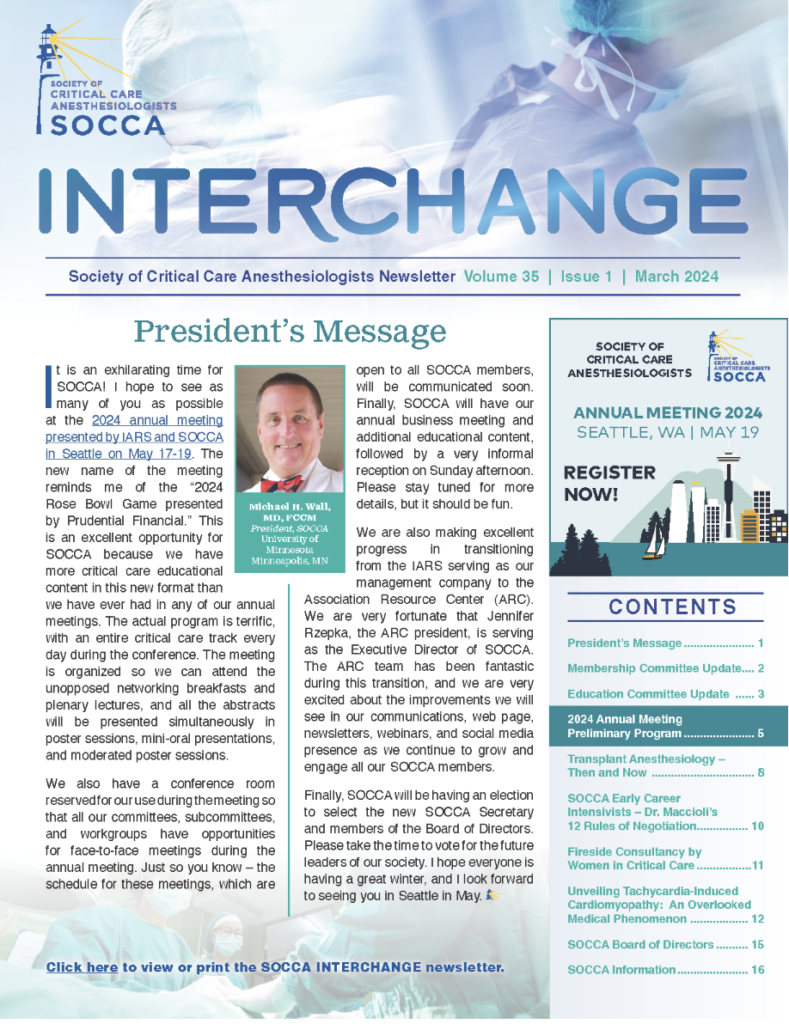by Miguel Cobas, MD, FCCM
The other day I was listening to one of my favorite podcasters (not in the medical field) about how she was forcing herself to wear regular clothes for five days in a row, as during the pandemic she had been wearing sweatpants for over 400 days and she had reached a point where she wanted to feel normal again.
Continue Reading…
Read members-only job posts—including roles with The University of Kansas Health System, Oregon Anesthesiology Group, and University of Florida Department of Anesthesiology—at SOCCA’s Job Board.
Continue Reading…
by Ashish K. Khanna, MD, FCCP, FCCM, FASA, Allison Dalton, MD, and Kunal Karamchandani, MD, FCCM
I was a second-year anesthesia resident when my teachers and mentors encouraged me to go the annual Society of Critical Care Anesthesiologists (SOCCA) meeting. At my very first meeting, I found the atmosphere very family-like, very open, very healthy and a lot of positivity all around. Ten years later, I chaired my very first SOCCA meeting at the recently concluded SOCCA Annual Meeting in 2021. I never thought that a decade of association with the SOCCA would get me here, and neither did I ever think that I would one day chair a virtual meeting.
Continue Reading…
by Suzanne Bennett, MD, FCCM and Alisha Bhatia, MD
A big welcome to all our new members to the SOCCA Membership Committee! We look forward to collaborating with you all. The main mission for the SOCCA Membership Committee is to coordinate all membership activities for SOCCA. Our membership numbers and interest in SOCCA continue to grow. To answer the asks of our members (‘I want to be more involved, but how do I do it?’), the SOCCA Membership Committee has launched a strategic structure realignment intended to better serve the members of SOCCA and the Anesthesiology Critical Care community. The realignment should foster increased engagement, diversity, and opportunities for members to contribute to the current and future of SOCCA.
Continue Reading…
by Kasey Grewe, MD
Our center has supported 43 patients with COVID-19 ARDS on ECMO. Of these, 8 cases (19%) were in peripartum women, and their rate of survival was 86%. Notable points regarding the pregnant cohort (4 patients) include the fact that all neonates born on ECMO were preterm and required intubation but ultimately survived.
Continue Reading…
by Santiago J. Miyara, MD
“Mostly Dead is Slightly Alive” has been for more than 40 years the maxim for Dr. Lance B. Becker when somebody claims that a cardiac arrest (CA) patient is dead. We believe that our failure in improving outcomes in CA has grounds in the “myth of the single magic bullet.” For decades, the mainstream of resuscitation science was represented by unsuccessful clinical trials targeting single pathways while expecting miracles. Unfortunately, we have not had very positive outcomes and still we are questioning if epinephrine should be routinely used during cardio-pulmonary resuscitation.
Continue Reading…
by Ashish K. Khanna, MD, FCCP, FCCM, FASA
Cardiac output monitoring is essential for understanding flow and pressure relationships in critically ill patients after cardiac surgery. While the Swan-Ganz catheter is the traditional gold standard, new technology has used relatively non-invasive methodology to estimate cardiac output. Long time interval (LTI) analysis of the arterial blood pressure waveform is one such method.
Continue Reading…
by Matthew Warner, MD and Shahzad Shaefi, MD, MPH
The SOCCA Research Committee is enthusiastic and energized heading into the 2021-2023 term! As we reflect on the past two years, there has been substantial growth in committee activities. Under the leadership of committee Chair Dr. Robert Stevens and Vice-Chair Dr. Matthew Warner, the committee developed several short surveys designed to assess the current state of anesthesiology-led critical care, including: clinical practice patterns, research initiatives and mechanisms of support, current and future models of anesthesia-based ICU training and education, anesthesiology intensive care engagement in the COVID-19 pandemic, and point of care ultrasound utilization in clinical practice.
Continue Reading…
by Ryan J Fink, MD and Chris Varani, MD
We previously reviewed data related to the risk of healthcare workers contracting COVID-19 in December of 2020 (Interchange:31[3]). One study of front-line healthcare workers demonstrated a 4% positive COVID-19 testing rate compared to just 0.33% for the general population. In a survey study of 105 anesthesiologists and intensivists at a New York City hospital, 58% reported a workplace exposure (mostly related to airway management), 26% of those reported COVID-19-like symptoms after that exposure, but only 12% of providers tested were found to be positive for antibodies.
Continue Reading…
by Louanne M. Carabini, MD, MA, FASA
According to Oxford Languages, to “practice” means to pursue a professional activity or exercise a skill regularly and routinely to improve proficiency. I am an anesthesiologist who “practices” critical care medicine and the residency program director for more than seventy-six residents in a large training program. I am also a mother, a wife, sister, and daughter; and I have to practice being human every day. We are all human, and we deserve more competence and proficiency as we interact together. Often, my biggest challenge that demands practice for proficiency is the transition from work to life.
Continue Reading…
by Shahla Siddiqui, MBBS, MSc (Medical ethics), FCCM
To at least some degree, we all entered medicine for altruistic reasons: helping others, finding meaning in providing comfort and care, and saving lives. We in critical care are especially driven to offer management of life-threatening disease states as well as solace and comfort to critically ill patients. This aspect has been highlighted in striking detail during the pandemic where, despite the grueling physical demands of working in ICUs during this time, the discomfort of PPE, and the trauma of watching so many people die and so many families suffer, we still find joy and reward in the lives we save and the families whose lives we touch by our compassion.
Continue Reading…



































